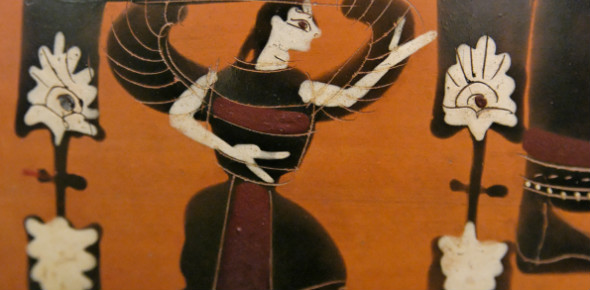
It wasn’t a foregone conclusion that Zeus would turn out to be a wise and just king. After all he came from a line of gods who were tyrants and acted to protect their own power. In fact he started out that way himself. Then something changed.
The story actually starts with his grandparents, Ouranos the sky and Gaia the earth. Ouranos valued his control over the cosmos. Whenever Gaia bore a child Ouranos buried the children in the earth so they would not challenge him. He filled Gaia until she groaned with pain. She appealed to her children to assist her. None wanted to challenge Ouranos until Kronos, who was offended at his father’s treatment of the Earth. He hid while Ouranos descended to lie with her and then leaped out and castrated him.
Having taken the kingship, Kronos married Rhea, and for a time they were happy. Kronos at first loved the children Rhea bore him – that is, until Ouranos and Gaia warned him that one of his children would surpass him. So he swallowed five of his children. When Zeus was born Rhea tricked Kronos and gave him a stone to swallow instead. Gaia hid Zeus until he grew. Then Gaia gave Kronos a potion that caused him to vomit up his sons and daughters. Zeus raised an army, defeated Kronos and locked him in prison.
Zeus started out on the same path as his father and grandfather. He used his thunderbolt to smite with anger. He chased goddesses and Titans and human women, deceiving them so they would lay with him. Just as they had warned Kronos, Ouranos and Gaia warned Zeus that Metis would bear him two children, a thoughtful daughter who would be his equal, then a haughty son who would surpass Zeus and become king of the gods.
Hesiod tells the story of what happened next. There are two versions. In Theogony Zeus hears this prophecy as Metis is about to bear his daughter Athena. He deceives Metis and places her in his belly. In the second version, a fragment captured by Chrysippus, Zeus gulps Metis, who then becomes pregnant with Athena.
When Apollodorus told the tale he explained why Zeus had to deceive or seduce Metis before ingesting her. Metis came from a family of known shapeshifters. There are two ways to conquer shapeshifters: hold onto them until they exhaust their repertoire of shapes, or trick them into taking a shape that can be conquered. In Theogony Zeus seizes Metis, in the second version Zeus may have tricked Metis into a form such as a bee so he could swallow her.
Hesiod’s version of Metis is very different from the one we meet in Homer. In the Homeric poems “metis” means cleverness, like the tricks Odysseus plays to navigate the perilous journey home. On the other hand Hesiod calls Metis:
- the one who of the gods and men knew most
- very prudent
- exceedingly wise
- author of justice
Two scholars make the case that this form of Metis derives from the Egyptian/Kemetic Ma’at. Christopher Faraone and Emily Teeter examine the Egyptian influence on Hesiod. It is clear that Hesiod heard Egyptian myth and saw Egyptian images. Faraone and Teeter point out that Metis and Ma’at are both anthropomorphized goddesses and abstract concepts.
The idea that Zeus “gulps” Metis points to another connection. Egyptian religious imagery portrays powerful pharaohs as making offerings to the gods. These offerings include incense, food, drink, and little images of a seated Ma’at. The gods were said to “eat” and “drink” Ma’at. Kings are the possessors of Ma’at and proclaim that they uphold Ma’at; their righteousness is what justifies their rule. Faraone and Teeter note that kings take the name of Ma’at to bolster their claims to the throne.
Metis lives within Zeus and advises him about what is morally right and wrong. This changes the character of Zeus. Before ingesting Metis his counsel is similar to the crooked counsel of his father Kronos and hints at the insane violence of his grandfather Ouranos. After Zeus places Metis where his violent emotions arise, his counsel becomes calm and wise. From that point in Theogony he no longer deceives goddesses and women. Instead he placidly marries a succession of wives, beginning with Themis, “Right Order”, with whom he fathers a succession of daughters (the Hours and the Fates) who uphold the social order.
Now that he is calm and wise the other gods consent to his rulership. This however is not the end of the story. Remember that Metis was either pregnant when swallowed or became pregnant after being swallowed. In any case she gave birth to the goddess Athena. Zeus felt a pressure in his head and complained about it; Hephaestus struck his head and Athena emerged, fully grown and dressed in armor.
This happened on the banks of the river Triton near Libya. That detail is important because it places Athena near the town of Sais where the Egyptian/Kemetic goddess Neith had a great temple. The ancients said Athena was a version of Neith. Both goddesses are weavers and warriors. Neith herself was one of the several deities said to have created the world from the waters of chaos.
There are several ways we can read the story of how Zeus became wise.
First, the reign of Zeus is an improvement on over the behavior of his father and grandfather. The cosmos is now set on a steady course and justice rules rather than might. Zeus accomplished this feat by absorbing the powers of a goddess. At the very least we can say that male rulership requires female guidance to create peace and prosperity.
We can point out that Zeus behaved as his male line was wont to do, by dominating his wife and suppressing the children who might surpass him. He arrogates to himself the wise counsel that belonged to Metis; now he takes the credit for the very quality that fit him to rule, but he did not possess it himself, he stole it. We can also see that Athena bears the wisdom of Metis and is the equal of Zeus. In ancient Greek myth she then acts to uphold his rule, a clear marker of male-centric society. Is this necessary or appropriate in the contemporary era? As we make new myths we may consider the idea that it may be just and necessary for Athena to succeed to the queenship.
We should also point out the colonialization in the myth. Zeus swallows Metis-as-Ma’at, the source of order in the cosmos. Greek philosophy and sense of justice derives from the Egyptian – the Greeks themselves tell us this. We must also remember that Athena bears the standard of Neith. The Athena who ascends to the throne of Zeus is black.
Reference: Faraone, Christopher A. and Emily Teeter. “Egyptian Maat and Hesiodic Metis.” Mnemosyne, Fourth Series, Vol. 57, Fasc. 2 (2004), pp. 177-208. Published by Brill. Stable URL: http://www.jstor.org/stable/4433545




